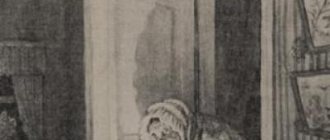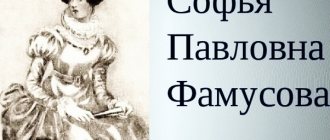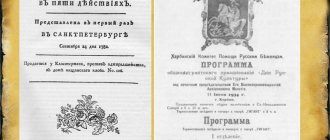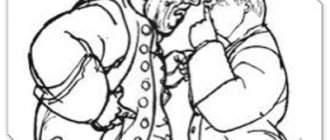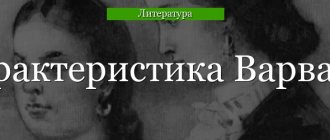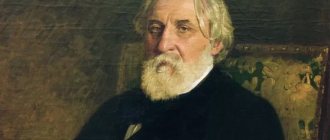The most educated man of his time, the progressive thinker Denis Ivanovich Fonvizin, at the end of the 19th century, created an amazingly bright satirical work, “The Minor.”
The plot of the comedy revolves around the struggle for the opportunity to marry the Prostakovs’ pupil Sophia. Mrs. Prostakova and her stupid son Mitrofanushka, Skotinin, Prostakova’s brother, and Milon, a young officer, Sophia’s lover, dream about this. Who is this Sophia, whose hand and heart are wanted by so many different people?
A young girl from a poor noble family was left without parents early on and is under the care of distant relatives of the Prostakovs. She is in a very powerless situation in this family. It gets to the point where they want to force her into marriage. First, Skotinin wants to marry her in order to take control of her estate, and then Prostakova, having learned that Sophia will become the heiress of a fortune, wants to marry her dunce son to her.
Sophia is the absolute antipode of Prostakova. She is a modest, educated girl, she received a good upbringing. Even living in such a dense family, she manages to read a lot and knows French. Sophia has the correct concepts of nobility and honor. “I will use all my efforts to earn the good opinion of worthy people,” she says in a conversation with Starodum. Her virtuous nature does not allow her to even condemn those rude, uneducated grabbers surrounded by whom she lived for some time. “Please tell me, are they guilty? Can every person be virtuous?” - apparently she is thinking about how people’s character develops, what can influence their formation. Sophia listens carefully to the teachings of her wise uncle and conducts a very reasonable conversation with him. In her young years, she already understands people well and values honesty and morality. She is not attracted by wealth; she wants to marry a conscientious, honest person. She is characterized by prudence and wisdom. No wonder her name means “Wise”.
In this comedy, Sophia has no negative traits. This image is ideal; against its background, the shortcomings of negative characters, their stupidity, lack of education, greed, and sycophancy become even more noticeable. The playwright wanted to show that even in conditions of simpletonism, a person, be it a man or a woman, can cultivate in himself the wonderful properties of the soul.
The comedy, written in the style of classicism, ends with the complete defeat of the negative characters and the victory of the positive ones. Starodum, Pravdin and Milon, united around Sophia, contribute to her liberation from the tutelage of the Prostakovs, and the girl happily gives her hand and heart to her chosen one.
The image of Sophia drawn by Fonvizin, although a little edifying, evokes sympathy and approval among readers.
Origin of the heroine
Sophia is from a noble family, she has an uncle whose name is Starodum:
...Her uncle, Mr. Starodum, went to Siberia...
She has no parents, she became an orphan, since her father died when she was a baby, and her mother died six months before the events described in the work. However, Sophia was partly lucky: she was not left without housing; her mother and father left her an estate.
After her mother passed away, the girl had to live with her relatives, the Prostakovs, since she could not live with her uncle yet: at that time he was doing military service in Siberia.
Life in the new family was not sweet. The Prostakovs kept her in their house and used her income, which came from the estate in the village. Relatives wanted her to become the wife of Skotinin, the brother of the stupid and cruel Prostakova, but this did not happen, since Prostakova found out that the girl had an inheritance. Then they wanted to marry her to Mitrofan, their stupid son, who did not want to study and achieve anything in life.
The heroine is the complete opposite of Mitrofan and they have nothing in common: he is spoiled in every possible way by his parents, and she is an unfortunate orphan. He is stupid, and she constantly reads books to develop spiritually and morally. She wants to study and cares about her future, has her own opinion and is a mature personality, while Mitrofan cannot decide anything without his mother.
Again, everything did not go according to the relatives’ plan, as Starodum arrived. Then Prostakova orders the girl to be kidnapped. Fortunately, everything ends well for Sophia.
What role does Sophia play in the comedy The Little One? A selection of quotes and sayings from characters from the comedy D
Sophia is Starodum’s niece (his sister’s daughter); S.’s mother is Prostakov’s matchmaker and in-law (like S.) of Prostakova. Sophia means “wisdom” in Greek. However, the name of the heroine receives a special connotation in the comedy: S.’s wisdom is not rational, not the wisdom, so to speak, of the mind, but the wisdom of the soul, heart, feelings, the wisdom of virtue.
The image of S. is at the center of the plot. On the one hand, S. is an orphan, and the Prostakovs took advantage of this in the absence of her guardian Starodum (“We, seeing that she was left alone, took her to our village and looked after her estate as if it were our own” - d. 1, yavl. V). The news of Starodum's arrival in Moscow causes real panic in the house of Prostakova, who understands that she will now have to part with the income from S.'s estate. On the other hand, S. is a girl of marriageable age, and she has a lover (Milon), to whom she promised her hand in marriage and heart, however, Prostakova reads her brother Skotinin as her husband. From Starodum's letter, Prostakova and Skotinin learn that S. is the heiress of her uncle's 10,000 rubles; and now Mitrofan is also wooing her, encouraged to marry by his mother, Prostakova.
Skotinin and Mitrofan do not like S., and S. does not like them, openly despising and laughing at both. Positive characters group around S. and actively contribute to her release from Prostakova’s petty and selfish tutelage. As the action progresses, the barriers to S.'s marriage to Milon crumble, and Prostakova's estate, as a result of this whole story, falls under the guardianship of the authorities.
Throughout the comedy, S.'s character remains unchanged: she is faithful to Milon, has sincere respect for Starodum and respects Pravdin. S. is smart, she immediately notices that Prostakova “has become affectionate to the very baseness” and that she “reads” her “and the bride to her son” (D. 2, App. II), is mocking (she makes fun of those who are jealous of her Skotinin and Mitrofan Milon), sensitive and kind (with ardor she expresses her joy when Starodum agrees to her marriage with Milon; in a moment of happiness, she forgives Prostakova for the harm caused and pities the “despicable fury”). S. comes from honest nobles who gave her an education (she reads Fenelon’s essay on the education of girls in French). Her simple feelings are humane: honor and wealth, she believes, should be achieved through hard work (D. 2, Rev. V), meekness and obedience to elders are appropriate for a girl, but she can and should defend her love. When Starodum, not yet knowing Milon, wants to marry S. to a certain young man, S. is “embarrassed” and believes that the choice of the groom also depends on her heart. Starodum confirms S’s opinion, and she immediately calms down, declaring her “obedience.”
Fonvizin made a lot of efforts to give S. lively features. To this end, he used the techniques of Western melodrama, combining dramatic moments with sensitive ones. However, he was more interested in raising an honest man worthy of the title of nobleman. Due to her youth, his heroine needed an experienced leader-mentor. She was entering a new, perhaps the most responsible phase of life, and the playwright did not pass by this. S.'s natural virtue had to receive a mental facet. On the threshold of the wedding, Starodum gives S. advice, from the content of which it becomes clear how he (and the author of “The Minor”) understands the correct upbringing of girls and women. Most of all, Starodum is afraid of the influence of “light”, which with its temptations can corrupt an innocent, pure and virtuous soul. Therefore, in the “world,” says Starodum, the first step is important, the ability to establish yourself and recommend yourself. The general rule is: friendship should be made with those who are worthy of it, that is, choose friends. S. is inexperienced and asks for clarification whether the preference of some will incur the anger of others. Starodum teaches her that there is no need to expect evil from people who despise you; evil comes from those who themselves are worthy of contempt, but are jealous of the virtues of their neighbor. S. considers such people pathetic, because such people are unhappy. Starodum warns: pity should not stop before evil, and virtue should follow its own path. There is no need to waste time on educating the “evil”, whom S. calls “unfortunate”, since every person, if he has a conscience, is obliged to awaken virtuous feelings in himself. Having learned the lesson, S. concludes that it is necessary to clearly and firmly show the evil person the baseness of his soul. Starodum adds: the mind of such a person is not a direct mind, that is, crafty, cunning, dishonest. True happiness comes from virtue and straight reason. Like Pravdin, S. understands happiness in the spirit of ordinary ideas: nobility, wealth. However, Starodum explains to her that nobility and wealth are not just titles and money, but “signs” of a person’s state and civil status, imposing moral obligations on him. Starodum teaches S. to distinguish between the real and the imaginary, external splendor and internal dignity; he is the opponent of egoistic happiness. And S. learns his lessons. She is also sure that a person does not live alone, that everyone is obliged to each other. But if this is so, then why, thinks S, won’t reason explain such a simple truth. Starodum responds with a wonderful phrase: “Good behavior gives direct value to the mind.” It is the soul, the “intelligent heart,” that makes an honest person “completely honest.” This way, the most important educational concepts are clarified for S. (intelligence, honor, service to the fatherland, the position of an honest person, good behavior, etc.). The seeds of Starodum fall on fertile soil, because the “inner feeling” of the initially virtuous S. tells her the same thing.
From general concepts about the nobleman and his positions, Starodum turns the conversation to the person, to the personal side of his life, to the family hearth. Having turned away from the path of virtue, the husband and wife stop loving each other, feeling mutual friendly affection and turn their life together into hell, forgetting about home and children. Starodum reminds S again and again: “virtue replaces everything, and nothing can replace virtue”; At the same time, he does not forget about the intimate side of marriage: “Just, perhaps, don’t have love for your husband, which would be like friendship. Have a friendship for him that would be like love.” Ultimately, the husband needs strength of mind (“prudence”), the wife needs virtue, the husband obeys reason, the wife obeys her husband. Old norms acquire new content, and the basis of family harmony again becomes the soul and the “good behavior” emanating from it. Therefore, raising an honest person - man or woman - consists of enlightening the soul.
Fonvizin’s work “The Minor” was written during the reign of Catherine II, when issues of social relations, upbringing and education of youth were especially relevant. In the play, the author not only raises acute problems of his contemporary society, but also illustrates the ideological concept with vivid collective images. One of these characters in the comedy is Sophia. Fonvizin’s “Minor” is, first of all, a classic comedy that highlights the educational ideas of humanism. In the image of Sophia, the author portrayed a perfect example of a Russian woman of the Enlightenment era - educated, intelligent, concise, kind and modest. The girl respects her parents, treats older and more authoritative people with respect, and is open to receiving true moral guidelines.
According to the plot of the play, Sophia had a difficult fate. At a young age, the girl’s father died, and half a year before the events described in the work, her mother died. Since her uncle, Starodum, was in the service in Siberia, Sophia, by the will of fate, ends up in the care of the rude, cruel and stupid Prostakova. The landowner is going to marry the girl off to her brother Skotinin without her knowledge. However, the news about Sophia's inheritance radically changes Prostakova's plans - the woman decides to woo her underage son Mitrofan in order to receive her share of the inheritance. The climax of the marriage story is the kidnapping of Sophia on the orders of the landowner, while the issue of the girl’s marriage had already been decided - Starodum approved Sophia’s choice to marry the honest and kind Milon. However, the ending of the comedy is happy for the girl - she remains with her loved one.
Girl character
In the image of Sophia in the comedy “The Minor,” Fonvizin showed what a real woman should be like in Russia during the Enlightenment. Sophia's characterization shows that the girl has a wonderful character with many advantages. Like other heroes, she has a “speaking” name, since its meaning (wise, wise, reasonable) fully reflects her character. In the comedy “The Minor,” the author describes this girl exactly this way. She is very gentle, kind and sensitive. She is also well educated and reads a lot of French books.
Main features of the heroine:
- meekness;
- modesty;
- patience;
- kindness;
- mind;
- education;
- the desire for true moral guidelines.
Her patience is surprising: she steadfastly endures everything that the Prostakovs do to her:
...How many sorrows have I endured since the day of our separation! My unscrupulous relatives...
Sofia and Prostakova
In the play, these two heroines are opposed to each other. According to the author's description, Mrs. Prostakova is very angry and rude towards all the people around her. She doesn't value her marriage and doesn't love or respect her husband. For a girl, on the contrary, her marriage is desirable, she does not want to become someone’s wife without love. She loves Milon and dreams of seeing him as her fiancé. Sophia respects and appreciates him as a man; for her, marriage is a very important step in life.
Prostakova believes that a woman:
- No education or reading required.
- You can only deal with housework, routine, everyday life, and raising children.
Sophia, on the contrary, strives for knowledge, wants to understand high things, reads a lot, which can characterize her as a smart girl.
Moral ideals
The girl appreciates it when people treat her well. Only her uncle treated her with kindness and affection, and she is very happy that he is in her life. Despite the fact that it was not easy for her, she was well brought up: she treats those older and more authoritative with respect and respect.
Those who raised Sophia paid special attention to morality, explaining that the main thing was family values, love for parents, justice and honesty, kindness towards those of lower status or poor. The author, using the examples of Sophia and Mitrofan, shows which upbringing is correct and which is not.
Fonvizin also shows that a child can adopt negative traits from his parents, as happened in the Prostakov family. The mother, moreover, suppressed her son as a person, because she loved to frighten him and order him what to do. Mitrofan has no opinion; he cannot resist his mother’s words and actions.
At the end of the work, the girl manages to stay with the one she loves and who loves her, this is officer Milon:
...young man Milon. He is in love with Sophia, and Sophia is in love with him: these faces... - honest, noble, educated...
Both before and now, girls like Sophia remain role models. This image, often used in essays and cinquains, shows readers what it is like to be an honest, kind, open and sympathetic person, even when fate gives difficulties along the path of life.
Essay about Sophia in Fonvizin's story
Sophia is Starodum's only and beloved niece. Besides, when she lost her parents, he was also her guardian. During his departure from the city, the Prostakovs take the girl to their estate. But they do this not because of their kindness, but only because they want to take away everything that Sophia has. But their plan is too obvious and simple for her. Sophia immediately opens it and looks at it all with irony and a grin. Sophia is a smart and cunning girl, but besides this, she is also smart and reasonable.
The main character is one of the positive characters in this comedy, where there is a lot of irony and ridicule. In addition, she attracts other good characters to her, such as Starodum or Pravdin. The heroine is a bright image, endowed not only with sensitivity and understanding, but also with the ability to think wisely and sensibly.
Throughout the comedy, Sofyushka’s character remains unchanged: she is always faithful to Milon, honors her uncle Starodum and respects Pravdin. The girl immediately understands that the landowner Prostakova is affectionate with her for a reason, she first wanted to marry the girl to her brother Skotinin, but as soon as she found out that she received a rich inheritance from her uncle, she decided to marry her beloved son Mitrofanushka.
Consequently, three men applied for the girl’s hand at once: Skotinin, Mitrofan and Milon, but only the latter loved Sophia sincerely and wanted to marry her, and not her inheritance.
When Starodum wants to marry Sophia to a young man unknown to her, she is embarrassed and says that the choice of the groom also depends on her. Starodum agrees with the girl, and she immediately calms down, saying that she loves only Milon and plans to marry him.
Despite the fact that Sophia’s uncle hardly participated in her upbringing, these two heroes have many similar traits - honesty, nobility, sincerity, kindness and good manners, and they both had their own point of view on life. Starodum sees that Sophia is drawn to knowledge and is constantly trying to find moral directions in books that could then help her in later life.
Thus, we can conclude that Sophia, as a heroine, performs the main function - she helps to reveal the true character of Mrs. Prostakova, her negative sides, and also all the best qualities of a person are embodied in the image of Sophia - intelligence, honesty, sincerity, nobility, kindness and many others that the author valued so much.

